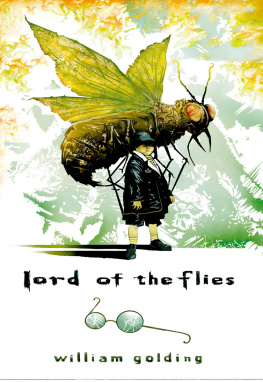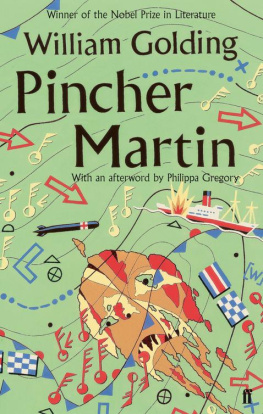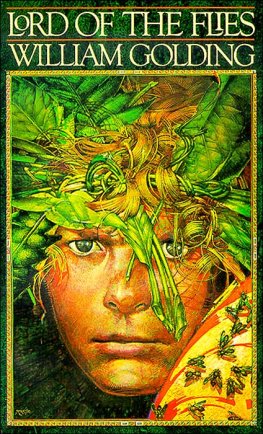William Golding - The Hot gates : and other occasional pieces
Here you can read online William Golding - The Hot gates : and other occasional pieces full text of the book (entire story) in english for free. Download pdf and epub, get meaning, cover and reviews about this ebook. year: 2013, publisher: Faber & Faber, genre: Art. Description of the work, (preface) as well as reviews are available. Best literature library LitArk.com created for fans of good reading and offers a wide selection of genres:
Romance novel
Science fiction
Adventure
Detective
Science
History
Home and family
Prose
Art
Politics
Computer
Non-fiction
Religion
Business
Children
Humor
Choose a favorite category and find really read worthwhile books. Enjoy immersion in the world of imagination, feel the emotions of the characters or learn something new for yourself, make an fascinating discovery.
- Book:The Hot gates : and other occasional pieces
- Author:
- Publisher:Faber & Faber
- Genre:
- Year:2013
- Rating:5 / 5
- Favourites:Add to favourites
- Your mark:
- 100
- 1
- 2
- 3
- 4
- 5
The Hot gates : and other occasional pieces: summary, description and annotation
We offer to read an annotation, description, summary or preface (depends on what the author of the book "The Hot gates : and other occasional pieces" wrote himself). If you haven't found the necessary information about the book — write in the comments, we will try to find it.
The Hot gates : and other occasional pieces — read online for free the complete book (whole text) full work
Below is the text of the book, divided by pages. System saving the place of the last page read, allows you to conveniently read the book "The Hot gates : and other occasional pieces" online for free, without having to search again every time where you left off. Put a bookmark, and you can go to the page where you finished reading at any time.
Font size:
Interval:
Bookmark:


The following pieces are collected from those I have written during the last ten years. They are all occasional in the strict sense of the word; so that now they are to acquire some sort of permanence I have edited them slightly, removing what seems no longer applicable, and here and there removing a remark I thought plain crass.
When I brought them together I found some contaminating awareness in my mind had so adjusted them to the requirements of their varying audiences that they fell into groups which might have been the work of different writers. I cannot conceal this faint dishonesty unless I rewrite the lot, and must let it go. Where my transatlantic editors altered my spelling to conform with American custom I have let it remain so. Our system and theirs are illogical though reasonable. Why choose between them?
I ought to say a little about the piece called Fable. In 1962 I was asked to give some lectures at UCLA in California. The second of these dealt with aspects of my novel LordoftheFlies, since it had become a campus requirement. I elaborated this lecture and took it round a variety of American universities where it answered some of the standard questions which students were asking me. I print it here, in the hope that it may continue to do so.
I have to acknowledge with thanks permission to reprint articles from TheSpectator, HolidayMagazine,TheTimes Literary Supplement and TheListener.
I had lunch in Lamia, a provincial town of Thessaly which lies on the route south to Athens. Most people go through Lamia without stopping, but I was following the route of the Persian invasion, that spectacular combined operation of almost twenty-five hundred years ago.
I had come down past Olympus and through the Vale of Tempe, with a classical atlas in my hand that made no mention of Lamia; so when I came unexpectedly on the town at midday, I rejoiced and thought of food. As Greek food goes, I was lucky. The time was early April, and outside every house people were grouped round an open fire. They had the Easter lamb spitted and were turning the repulsive, naked thing over the coals, hour after hour. So I ordered Easter lamb in the certainty of knowing what I would get; and it was so.
I drank ouzo as an apritif, dribbling it into a tumbler of water. It tasted like licorice and looked like milk. They say you cant drink Greek water without getting typhus, but I did. Theres no other way of drinking ouzo, and if you dont drink ouzo as an apritif in a Greek provincial town, you go without.
Lamia central square was hot and dusty. The tables of the one restaurant spilled out on the pavement in the shade of some small trees. I managed to stop the waiter bringing me the wine of the country. This is retsina, which should be drunk once and avoided thereafter. It stinks of resin and tastes like paint remover. You must insist on an island wine, Rodos, say, or Demestica, which I got that day and liked.
It was in these parts, in 480 B.C ., that the Persian army had been held up for a few days on its way to Athens. South of Lamia, the river Spercheios has cut a valley athwart the invasion route, and the road must crawl round the corner on the other side of the valley between the cliffs and the sea. Sitting beneath a tree, and drinking my Demestica, I thought about Athens and Persia, and the hot springs that bubble out of the cliff where the road is narrowest, so that the Greeks call it the Hot Gates. I thought of myself too dreaming for twenty years of coming here, poring over ancient maps; and now faced with the duty and the necessity of trying to understand.
I had seen the valley of the Spercheios when I entered Lamia, had glimpsed the vast wall of rock five thousand feet high on the other side of the valley, which lay between me and Athens. Athens was shining Athens, the Athens of history, shining in the mind. Yet when the Persian Xerxes, King of Kings, drove his army at her, she did not shine. At that time she was little but a thorn in his side, a small city which had insisted on running her own affairs and had an odd knack of encouraging cities which ought to bow to the King of Kings to do the same.
Athens needed thirty years, and then she would shine as no city had shone before or has shone since. For all her faults she would take humanity with her a long, long step but on that day she was nothing but a pain in the neck of the King of Kings, who had the greatest army in the world poised at her last gate.
I had cafturque in a minute cup one third black liquid and two thirds sludge, a delightful combination and Greek Cognac. If you have begun with ouzo, do not finish with Greek Cognac. Even when separated by Demestica, they strike on each other like a match on the matchbox and produce a flame that does not readily die out.
I had my Cognac, and being English (mad dogs and Englishmen), marched out into the midday sun while the rest of Greece went sensibly to sleep. I sat down under an olive tree on the north side of the valley, where Xerxes may have stood to consider the small remaining problem before him. Mine was different. I had to re-create his problem. The Spercheios has brought so much mud down the valley that fields have pushed miles out into the sea. Where there was once a narrow pass, there is now room for road and rail, and fields that lap round the corner.
I went back for my car and drove down into the little valley and across the plain. A new motor road lies across it and sweeps round the corner where the old Hot Gates had lain between the cliffs and the sea. The road was unsurfaced, and in the rearview mirror I saw the great white cloud of dust that hung in the air behind me until it settled on the crops.
The Hot Gates were deserted. I came to an avenue and then to a group of mean-looking buildings huddled among trees. I drove in, but of course there was no one about. It was a spa, I supposed, and as far as I was concerned, on that burning afternoon, anyone who wanted a hot bath with native sulphur was welcome to it. I sat in the car and considered that history has left not a trace of scar on this landscape.
At the time of the Persian invasion, when the sea came close to these cliffs, the narrow track had held seven thousand men Spartans, Thebans, Locrians, Thespians, Phocians who watched one another as much as they watched the enemy. Greece to the south was in a turmoil as the Persians marched toward it. What to do? Whom to trust? What to believe? The track that summer was thick with dusty messengers bearing appeals for help, or accusations, or denials, or prayers to the gods. In any event, with Xerxes only a few miles away, there was a mixed force to hold the track groups sent by the cities of Greece, and small groups at that. No city dared strip itself of troops.
Was there no memorial left? I drove out of the avenue and found one man awake at last. He was a goatherd carrying a thumbstick and a whistle. His goats were a tumultuous jumble of horns, of black and brown fur with ruffs and edgings of white, and staring, yellow, libidinous eyes. You see these herds in Greece as you may see flocks of sheep on a country road in England. Each goat has its bell, and the tinny concert, half-heard from the side of a mountain, is one of the evocative sounds of Greece. I asked him about the Hot Gates, and he pointed forward along the road. Then he turned aside with his goats and they began to file off and scatter up the side of the cliffs.
Font size:
Interval:
Bookmark:
Similar books «The Hot gates : and other occasional pieces»
Look at similar books to The Hot gates : and other occasional pieces. We have selected literature similar in name and meaning in the hope of providing readers with more options to find new, interesting, not yet read works.
Discussion, reviews of the book The Hot gates : and other occasional pieces and just readers' own opinions. Leave your comments, write what you think about the work, its meaning or the main characters. Specify what exactly you liked and what you didn't like, and why you think so.











